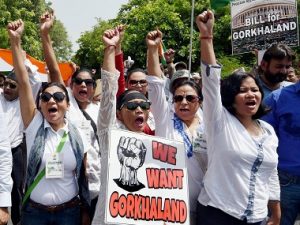 Darjeeling : The crucial talks in Kolkata on Tuesday between West Bengal Chief Minister Mamata Banerjee and leaders of the regional parties, demanding a separate state of Gorkhaland to be carved out of the hills and parts of the plains in north Bengal, have thrown up more questions than answers.
Darjeeling : The crucial talks in Kolkata on Tuesday between West Bengal Chief Minister Mamata Banerjee and leaders of the regional parties, demanding a separate state of Gorkhaland to be carved out of the hills and parts of the plains in north Bengal, have thrown up more questions than answers.
The stakeholders concerned are in for yet more bouts of political gamesmanship, even as the shutdown in the hills of Darjeeling and adjoining Kalimpong, lumbers on closing in on its twelfth week. While anxieties in the region over its political future mount with its residents left wondering whether the discussions — the first between the West Bengal government and the leaders of the on-going agitation since the strike began in mid-June — will facilitate any return to normalcy in the region, what is also dominating public discourse is how much credence should be given to indications of a possible re-alignment of forces behind the stir.
Indications loom of fissures appearing within the leadership spearheading the statehood movement and the question being asked is how it might impact the course of the agitation. After bearing the brunt of the lockdown, something is indeed moving, but in which direction is the collective refrain.
Leaders of the Hill parties find themselves in a quandary, something which has been becoming increasingly clear to both the Centre and the State government as the stir moves on from one day to the next. What was being perceived as an apparent indecisiveness among those steering the agitation and their dithering over chalking out a concrete programme regarding the future of the stir seems to viewed by Mamata as an opportune time to invite the Hill leaders to the negotiating table following overtures from the other side. Moreover, the optics were important for both the sides, perhaps more so for the Hill parties, having raised the expectations of the local people on the Gorkhaland issue.
For the state government, the challenge was on how best to skirt the statehood demand in the course of the talks without betraying any signs of outright intransigence on the matter even though Mamata has not minced words rejecting it on previous occasions. And, in all fairness, she did it well. The significance of her remarks on the matter, made public shortly after the discussions, cannot be missed.
In a clear attempt to placate those behind the Gorkhaland demand, she admitted the need to be “sensitive” on an issue that is “close to their hearts” and that the movement sees resurgence “every 10 to 15 years”. Not only were her words an indication of her government’s desperation to ensure that normalcy return to the Hills, having been guilty of gross political miscalculations that precipitated the stir in the Hills in the first place, they are also being construed as an admission that the demand cannot be “bulldozed” if her party has any hopes of renewing its efforts to position itself politically in the Hills.
Mamata, in the past, has been accused of creating “divisions” within the local people by setting up development boards along ethnic lines in the region by a section of the political leadership in the Hill. They have alleged that it’s part of a design to gain access in the local political firmament. Mamata’s moves have been successful, having wrested one of the four Hill municipalities in the civic polls earlier this year. But subsequent developments in Darjeeling and adjoining districts which led to the agitation have come as a major setback, forcing her party to lick its wounds while an entire region has been thrown into a state of lockdown.
That her party, the Trinamool Congress, is jockeying for greater prominence in a region that has long been dominated by local regional grouping has been clear for quite some time; now questions are being asked whether she is also stoking rifts within the regional political dispensation. Her being able to wrangle the required overtures and subsequently get a delegation from the principal political force in the Hills — the Gorkha Janmukti Morcha (GJM) — to attend the talks and discuss issues beyond the Gorkhaland demand, despite the diktat from its president Bimal Gurung that nothing but the statehood issue should be on the agenda, is being viewed with considerable interest in political quarters.
Chief architect of the ongoing stir, Gurung, who has been slapped by the police with charges under the Unlawful Activities (Prevention) Act in connection with the blasts in Darjeeling and Kalimpong earlier this month, was of course, not present during the discussions.
Mamata has called for yet another round of bi-partite talks at the secretariat in Siliguri in north Bengal on 12 September adding that the “process of dialogue” will continue even though she continues to be averse to discussions on the Gorkhaland demand. However, whether the GJM that has been maintaining that this time around as opposed to earlier occasions, there will be no climb-down on the statehood issue, will be affirmative in its response to future meetings awaits to be seen. Going by reports of Gurung’s initial reaction to what transpired in Tuesday’s talks, he is clearly not pleased.
Those representing the party in the discussions might have some explaining to do. This begs the question: are the Hills in for yet another round of political uncertainty?
Bureau Report
Leave a Reply